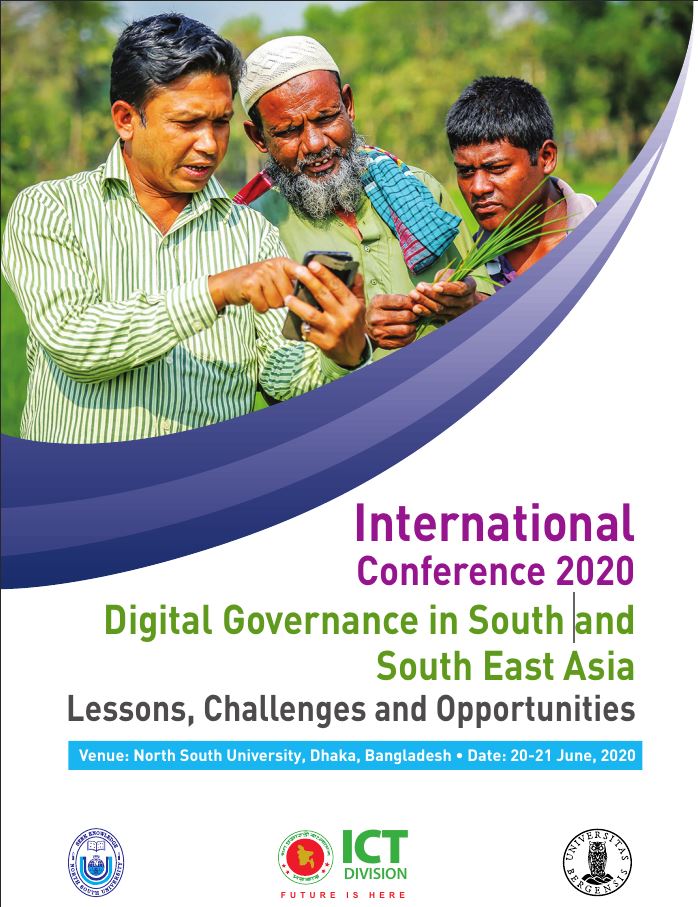International Conference 2020 Digital Governance in South and South East Asia

International Conference 2020
Digital Governance in South and South East Asia
Lessons, Challenges and Opportunities
Venue: North South University, Dhaka, Bangladesh • Date: 20-21 June, 2020
Call for Papers
Information and communication technologies (ICT) have tremendous potential to enhance the lives of people in general and, particularly, those in developing countries.
For about a decade, use of technology in governance has introduced a new paradigm of service delivery. During the recent years Digital Governance has emerged as an effective tool and process of participation, accountability and inclusive governance aiming to install a system “whole of governance” in the developing countries. It has also begun to change existing state society relations and strengthened and institutionalized the concept of “whole of governance“in those countries. This leads to better service delivery, motivating people to participate in governance processes, ensuring efficiency, accountability and transparency. In a globalised world, it is now recognized as a tool for transforming the relations between citizens, businesses, and other organs of government.
Digital Governance ensures that citizens can participate in, and influence decision-making processes which affect them and pro-actively decide what they want and its quality as well governance processes which can best deliver them. Faster expanding computerisation and internet connectivity has attracted governments in the region to re-engineering of business processes for quicker and quality service delivery to citizens, business and the society. The ongoing Digital Governance process is also considered appropriate for achieving the UN’s 2030 Sustainable Development Goals (SDGs). Digital Governance is thus creating a paradigm shift in the public sector as well as transforming societies across the world. While the state remains the key actor, the other actors also need to participate and network amongst themselves to enable the society reap full benefits of technological as well as innovations. It opens up avenues for development of societies and ensuring better service to citizens, and also creates challenges for many governments as well as private sector and citizens.
Countries of South East Asia are at the forefront of digital developments in fields of governance, entertainment, and e-commerce. Singapore, South Korea and China are leaders in the area of Digital Governance in the region. In the context of South Asia, India and Bangladesh have taken initiatives to utilize ICT to deliver better services to the people. However, are all countries in the region taking advantage of Digital Governance?
Do nations have same experiences, capacities and resources to make it work? Can they learn from experiences of other countries? What are the barriers? What works and what doesn’t and why? Does the public and private sector have different views and utilize Digital Governance differently? Or is there is convergence? Will Digital Governance enable nations and their citizens to reach desired goals and transform their lives? Is Digital Governance changing state society relations? These questions need answers and sharing of views and experiences.
In this context, the South Asian Institute of Policy and Governance of North South University, Bangladesh in collaboration with Information and Communication Technology Division, Government of People’s Republic of Bangladesh and the Department of Administration and Organization of University of Bergen, Norway is arranging a Conference on 20-21 June, 2020 in Dhaka on ‘Digital Governance in South and South East Asia: Lessons, Challenges and Opportunities.
Conference Themes
The Conference committee is inviting papers from scholars, researchers, practitioners Government agencies, civil society members and graduate students across the globe to share knowledge, experiences, and learning in context of Digital Governance in the region with the aim to capitalize on the use of digital technology in ensuring quality of service delivery and streamlining the overall governance processes on the following thematic areas:
● Evolution and Current Trends in Digital
● Digital Governance and Changing Governance Ideas of Public Sector
● Social Media and Digital Governance: Ethical and Accountability Issues
● Innovations and Entrepreneurship Ethical and Accountability Issues in an Era of Digitalisation
● Big Data and Public Governance
● Digital Governance and SDGs: Strategies and Challenges
● Public Policy and Digital Governance Strategies and Challenges
Key Note Speaker
Professor Kim Normann Andersen is Study Program Director for the IT-focused bachelor and master programs at the Department of Digitalization at Copenhagen Business School (CBS), of University of Copenhagen, Denmark. His research focuses on implementation and impacts of technologies in government such as robots, online communication, self-service, social media. He has been a visiting scholar in Asia, USA, and Europe and involved in a number of EU and EU-Asia projects. He has been in various international and national committees on open document standards and large scale IT projects.
Abstracts Submission Guidelines
Abstract should be within 300 words and should include the objectives, methodology and findings. Abstract must be related to any of the sub-themes of this conference and should be submitted online at www.digiconf2020.com. The last of date of abstract submission is 28 February 2020. Abstracts should be written in English using Times New Roman font and submitted in MS Word doc/docx format. Notifications on decisions about acceptance of abstracts/ papers will be given by 16 March 2020. Selected papers will be published in an edited book and a peer-reviewed journal. The papers should be properly referenced with APA style.
Please visit www.digiconf2020.com for abstract submission and other information regarding the conference.
Important Dates
√ Last date of abstract submission : 28 February 2020
√ Intimation of acceptance of abstracts : 16 March 2020
√ Full paper submission : 1 June 2020
√ Last date of registration : 10 June 2020
√ Conference Dates : 20-21 June 2020




